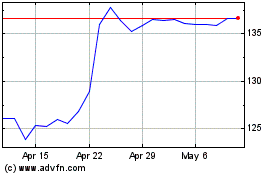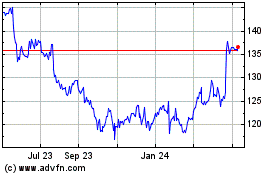By Akane Otani and Michael Wursthorn
Investors once attracted to the steady payouts of companies
selling staples like breakfast cereal, toothpaste and razors are
shopping elsewhere.
A series of disappointing earnings reports from industry giants
like Philip Morris International Inc., Procter & Gamble Co. and
Kimberly-Clark Corp. have sent consumer-goods shares tumbling in
recent days -- a sign many investors remain skeptical of the
companies' ability to cope with rising costs, as well as to fend
off online competitors like Amazon.com Inc.
The sector's underperformance comes as a surprise to analysts
who had expected signs of a pickup in inflation to drive investors
into shares of businesses that sell household goods and basic
necessities: products that consumers would typically be willing to
buy, even when rising prices crimp their spending elsewhere.
Instead, companies competing with discount retailers are struggling
to raise prices for their marquee products -- something recent
earnings reports show has become a growing headwind for their
businesses.
Even hefty dividend payouts haven't been enough to lure
investors into shares of consumer-staples companies, which have
shed 13% in the S&P 500 this year and posted the biggest losses
of the broad index's 11 sectors. The S&P 500 has fallen
1.5%.
The industry's pricing issues have many money managers wondering
whether the biggest makers of household staples have already seen
their best days.
"What's happening is that these firms are struggling to pass on
rising costs to consumers," said Shawn Cruz, manager of trader
strategy at TD Ameritrade. "Big brands have counted on their brand
name drawing customers in, and that's not necessarily happening
anymore."
One of the worst days of the year for the consumer-staples
sector came Thursday, when tobacco giant Philip Morris said
quarterly shipments fell more than expected as consumers world-wide
continued to turn away from cigarettes. Philip Morris shares fell
16%, posting their biggest one-day percentage decline since going
public in 2008, according to FactSet. The stock is off 22% for the
year.
Many companies serving up consumer staples have suffered more
broadly, though, from rising competition from online retail giants,
which have put pressure on firms to keep product prices low.
Shares of Procter & Gamble, the maker of Tide detergent and
Pampers diapers, have shed 21% this year, making them one of the
worst performers in the sector. The company has cut prices across
its businesses, including its Gillette razors, to try to stave off
competition from other low-cost rivals like Dollar Shave Club --
something that crimped its sales growth in the most-recent
quarter.
Another company that has fallen behind: General Mills Inc.,
whose shares have tumbled 25% this year as it has grappled with
what Chief Executive Jeff Harmening said was an "unprecedented rise
in logistics costs."
That has forced it to lower its earnings expectations for the
year, with company projections now suggesting per-share earnings
for the fiscal year ending in May will rise by just 1% compared
with the 4% increase previously estimated. Although freight and
commodity costs have increased, companies like General Mills,
Campbell Soup Co., Kellogg Co. and Conagra Brands Inc. have
struggled to protect profits by raising prices for products, citing
steep competition from discount retailers.
Some consumer-products companies are taking more drastic steps
to slash costs to protect thinning profit margins. Kimberly-Clark,
which makes Huggies diapers and Kleenex tissues, kicked off a
massive restructuring of its operations earlier this year that is
expected to deliver annual pretax savings of as much as $550
million by the end of 2021. But the overhaul is projected to be
pricey, with total costs reaching as much as $1.9 billion before
then.
Those charges weighed on Kimberly-Clark's first-quarter
earnings, which were reported Monday, but the company boosted its
sales forecast for the year. Shares fell 1.5% Monday. CEO Thomas
Mr. Falk said the cost cuts are necessary, along with the
development of new products and some stronger pricing, to put the
company, and the industry at large, on firmer footing.
Some analysts believe a wave of stock volatility that spurs
demand for so-called haven assets could prompt a rebound in
consumer-staples shares, which many consider bondlike because of
their dividends.
As of the end of March, 33 of 34 companies in the
consumer-staples sector had boosted dividend payouts to
shareholders, according to data from S&P Dow Jones Indices,
with the average yield clocking in at 3%, above the broader S&P
500's average dividend yield of 2.4%.
Still, sectors that investors tend to think of as safety plays
-- telecom, real estate and utilities -- have fallen alongside
staples to rank as the worst-performing sectors in the S&P 500.
Meanwhile, investors have extended bets on technology companies
that they believe will be able to deliver faster earnings
growth.
And with recent earnings reports pointing to sluggish sales
growth among several consumer giants, many anticipate a tough road
ahead for the sector.
"It's concerning for these companies," said Charlie Smith, chief
investment officer of Fort Pitt Capital Group. "There's just not a
lot of inflation in the system and the ability of these
consumer-product companies to push pricing just isn't there."
Write to Akane Otani at akane.otani@wsj.com and Michael
Wursthorn at Michael.Wursthorn@wsj.com
(END) Dow Jones Newswires
April 25, 2018 05:44 ET (09:44 GMT)
Copyright (c) 2018 Dow Jones & Company, Inc.
Kimberly Clark (NYSE:KMB)
Historical Stock Chart
From Mar 2024 to Apr 2024

Kimberly Clark (NYSE:KMB)
Historical Stock Chart
From Apr 2023 to Apr 2024
